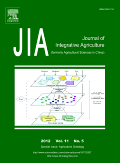
Journal of Integrative Agriculture
Scope & Guideline
Elevating Agricultural Research to New Heights
Introduction
Aims and Scopes
- Crop Genetics and Breeding:
Research on genetic improvement of crops including identification of quantitative trait loci (QTLs) for various traits such as disease resistance, yield, and stress tolerance. - Sustainable Agriculture Practices:
Studies that explore sustainable farming techniques, including organic farming, integrated pest management, and the use of cover crops to improve soil health and crop yield. - Plant-Soil Interactions:
Research focusing on the interactions between plants and soil microorganisms, including the impact of soil amendments and microbial communities on crop productivity. - Climate Change Impact on Agriculture:
Investigations into how climate variability affects crop yields, pest dynamics, and overall agricultural productivity. - Precision Agriculture and Technology:
Application of advanced technologies such as remote sensing, machine learning, and UAVs in monitoring and managing agricultural practices to enhance productivity and sustainability. - Food Security and Nutrition:
Research that addresses issues related to food security, nutritional quality of crops, and the socio-economic implications of agricultural practices.
Trending and Emerging
- Climate Resilience and Adaptation Strategies:
Increasing focus on developing crop varieties and agricultural practices that can withstand climate change effects, such as drought and extreme temperatures. - Biotechnology Applications in Agriculture:
Growing interest in genetic engineering, CRISPR technologies, and molecular breeding techniques to enhance crop traits and resistance. - Sustainable Water Management Practices:
Research exploring efficient irrigation techniques, water conservation strategies, and their impact on crop yield and sustainability. - Nutritional Quality Enhancement:
Studies aimed at improving the nutritional content of crops, addressing the dual challenges of food security and health. - Soil Microbiome and Health:
Emerging research on the role of soil microbial communities in enhancing plant health and soil fertility, emphasizing the importance of microbial diversity. - Socio-economic Factors in Agriculture:
Increased attention on the socio-economic aspects of agriculture, including farmer behavior, market dynamics, and the impact of policies on agricultural practices.
Declining or Waning
- Traditional Pest Control Methods:
Research on conventional chemical pest control methods has decreased as there is a growing emphasis on integrated pest management and biological control strategies. - Single Crop Systems:
There has been a noticeable decline in studies focused solely on monoculture systems as more researchers explore the benefits of crop rotations and intercropping. - Soil Fertility Management using Inorganic Fertilizers:
As organic and sustainable farming practices gain popularity, research focused exclusively on inorganic fertilizers is becoming less common. - Livestock Production without Sustainable Practices:
Research that does not incorporate sustainability aspects in livestock production practices is seeing reduced attention as the field moves towards more integrated and eco-friendly approaches.
Similar Journals

Agricultural Science and Practice
Advancing agricultural knowledge for a sustainable future.Agricultural Science and Practice is a pivotal journal dedicated to advancing knowledge and research in the field of agricultural sciences. Published by the NATIONAL ACADEMY OF AGRARIAN SCIENCES OF UKRAINE, this journal serves as a vital resource for researchers, professionals, and students engaged in agriculture, agronomy, and related disciplines. The journal aims to disseminate high-quality, peer-reviewed articles that address contemporary issues, innovative practices, and advancements in agricultural methodologies. While currently specified as non-open access, the journal endeavors to contribute significantly to the global agricultural knowledge pool while fostering a collaborative research environment. With its base in Kyiv, Ukraine, Agricultural Science and Practice plays an essential role in highlighting regional agricultural challenges and solutions, thereby attracting a diverse readership that aspires to enhance food security and sustainable farming practices worldwide.

Agronomy-Basel
Fostering Collaboration in Crop Management and SustainabilityAgronomy-Basel is a leading international journal dedicated to advancing the field of agronomy and crop science, published by the respected MDPI. Since its inception in 2011, this open-access journal has provided a vital platform for the dissemination of high-quality research, featuring innovative studies and reviews that contribute to the understanding of agricultural practices and crop management. With an impressive impact factor and ranked in the Q1 quartile of its category for 2023, Agronomy-Basel has established itself as a premier resource in the realm of Agricultural and Biological Sciences, achieving a commendable rank of #62 out of 406 in its field, placing it in the 84th percentile. The journal targets researchers, professionals, and students who are dedicated to enhancing agricultural sustainability and productivity. Located in Basel, Switzerland, the journal's commitment to open access empowers global accessibility to flourishing agricultural advancements, thus fostering collaboration and innovation across the globe.

PAKISTAN JOURNAL OF AGRICULTURAL SCIENCES
Fostering Sustainable Solutions in Agricultural SciencesWelcome to the Pakistan Journal of Agricultural Sciences, a prominent platform for disseminating vital research findings in the fields of agronomy, crop science, food science, plant science, and soil science. Published by the prestigious University of Agriculture in Faisalabad, this journal aims to enhance the scientific discourse surrounding agricultural innovation and sustainability in Pakistan and beyond. With an ISSN of 0552-9034 and E-ISSN of 2076-0906, the journal serves as a valuable resource for researchers, professionals, and students interested in cutting-edge agricultural developments. As of 2023, the journal is ranked in the Q3 category for Agronomy and Crop Science as well as Food Science and positioned in Q4 for Plant and Soil Science, highlighting its growing impact within a competitive academic landscape. While the Pakistan Journal of Agricultural Sciences is not currently open access, it provides a comprehensive archive of research converging from 2011 to 2024, ensuring that critical knowledge remains accessible to those striving to advance the agricultural sciences. Join us in our mission to foster innovation and support sustainable practices in agriculture.

International Journal of Agriculture and Natural Resources
Connecting Researchers for a Greener TomorrowInternational Journal of Agriculture and Natural Resources is a premier academic journal published by the Pontificia Universidad Católica de Chile, Facultad de Agronomía e Ingeniería Forestal. With an ISSN of 2452-5731 and an e-ISSN of the same, this journal operates as an Open Access publication, allowing for the widespread dissemination of research findings pertinent to the fields of agriculture and natural resources. As of 2023, it holds a commendable Q2 ranking in Agricultural and Biological Sciences, indicating its significant contribution to the field. The journal's objective is to provide a platform for innovative research and in-depth analyses on emerging trends and challenges within agriculture, promoting sustainability and ecological balance. Covering a broad spectrum of topics, it aims to foster dialogue among researchers, professionals, and students, ultimately enhancing knowledge and fostering collaboration. With a current Scopus rank of #93 out of 221 in the general agricultural and biological sciences category, it occupies a vital role in advancing research and practices in agriculture and related disciplines.
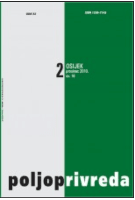
Poljoprivreda
Exploring the frontiers of agriculture since 2000.Poljoprivreda is a distinguished open-access journal dedicated to the field of agronomy and crop science, published by the FAC Agriculture Osijek in Croatia. Since its inception in 2000, the journal has been committed to disseminating high-quality research that informs both academic and practical advancements in agriculture. With an ISSN of 1330-7142 and an E-ISSN of 1848-8080, Poljoprivreda provides a vital platform for researchers, professionals, and students to engage with the latest findings and methodologies in agronomy, contributing significantly to the enhancement of agricultural practices in Croatia and beyond. Although currently ranked in the 22nd percentile within its category according to Scopus, the journal aspires to elevate its standing by welcoming innovative research that addresses contemporary challenges within the agricultural sciences. By fostering open access since 2000, Poljoprivreda ensures that its scholarly content is freely available, promoting wider dissemination and collaborative opportunities among researchers globally.
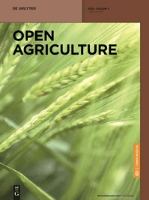
Open Agriculture
Nurturing Ideas for a Greener TomorrowOpen Agriculture, published by DE GRUYTER POLAND SP Z O O, is an innovative open-access journal dedicated to advancing research in the Agricultural and Biological Sciences. Since its inception in 2016, this journal has been committed to disseminating knowledge and facilitating collaboration among researchers, professionals, and enthusiasts in the agricultural sector. With an impressive Q2 ranking in the Agricultural and Biological Sciences category, it holds a prestigious position, ranking #65 out of 221 in its field, placing it in the 70th percentile. Open Agriculture offers a platform for high-quality research across a diverse range of topics, ensuring that crucial findings are readily accessible to the global scientific community. The journal continues to uphold its mission of promoting sustainable agricultural practices and innovations that address contemporary challenges in food security and environmental sustainability. With its strong commitment to open access principles, researchers and students alike can easily engage with cutting-edge research and contribute to the vibrant discourse surrounding modern agriculture.

SPANISH JOURNAL OF AGRICULTURAL RESEARCH
Leading the Way in Agricultural Science AdvancementsThe Spanish Journal of Agricultural Research (ISSN: 1695-971X, E-ISSN: 2171-9292), published by the prestigious Consejo Superior Investigaciones Cientificas (CSIC), serves as a vital resource for those engaged in the fields of agronomy and crop science. Established as an Open Access journal since 2003, it aims to foster the dissemination of innovative research and practical applications related to agricultural practices and sustainability. With its Q3 category in Agronomy and Crop Science and a Scopus ranking of #224 out of 406, the journal provides an accessible platform for scholars to share valuable findings that enhance agricultural productivity and environmental stewardship. Covering research from 2006 to 2024, this journal continues to be instrumental for researchers, professionals, and students eager to remain at the forefront of agricultural science advancements.

Agrosystems Geosciences & Environment
Unlocking insights for optimal soil and crop management.Agrosystems Geosciences & Environment, published by WILEY, is a premier open access journal dedicated to advancing the interdisciplinary field of agricultural and environmental sciences. With an E-ISSN of 2639-6696, the journal has gained recognition since its inception in 2018, currently holding a Q2 ranking in Agricultural and Biological Sciences, Plant Science, and Soil Science. Operating from the United Kingdom, Agrosystems Geosciences & Environment contributes significantly to knowledge generation and dissemination, offering vital insights into sustainable practices, soil management, and crop optimization. Researchers and professionals will find the open access model particularly advantageous, promoting greater visibility and engagement within the scientific community. By bridging the gap between geosciences and agrosystem management, this journal is vital for those committed to addressing today's critical environmental challenges.
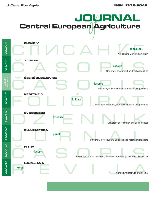
Journal of Central European Agriculture
Fostering Innovation in Agronomy and Animal ScienceThe Journal of Central European Agriculture, with ISSN 1332-9049 and E-ISSN 1332-9049, is an esteemed platform published by UNIV ZAGREB, FAC AGRICULTURE that caters to the dynamic fields of agronomy, crop science, and animal science. Since its establishment in 2000, this Open Access journal has played a crucial role in disseminating critical research findings while fostering collaboration among academics, researchers, and professionals within the agricultural community. The journal, which is based in the heart of Croatia, spans a rich history of scholarship, with its content available for free to readers and contributors alike. As reflected in its current standings, the journal has achieved a Quartile 3 ranking in Agronomy and Crop Science and Quartile 4 in Animal Science and Zoology for the year 2023, indicating its growing influence within these disciplines. With Scopus ranks placing it in the 32nd percentile among its peers, the Journal of Central European Agriculture is committed to advancing agricultural sciences not only in Central Europe but globally as it prepares for its converged years from 2007 through 2024. This journal serves as a vital resource for innovative research, practical applications, and a deeper understanding of agricultural challenges and solutions.
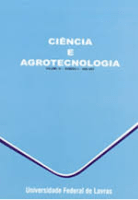
CIENCIA E AGROTECNOLOGIA
Fostering Knowledge Exchange in Agronomy and BeyondCIENCIA E AGROTECNOLOGIA, published by UNIV FEDERAL LAVRAS-UFLA, is a vital open-access journal since 2005 that serves as an influential platform for disseminating research in the fields of Agronomy, Animal Science, Food Science, Soil Science, and Veterinary Science. With its ISSN 1413-7054 and E-ISSN 1981-1829, this journal is recognized for its contribution to science and technology advancements in agriculture, particularly in Brazil, fostering knowledge exchange among researchers, professionals, and students. Currently ranked in the Q2 quartile for Agronomy and Crop Science, Animal Science and Zoology, and in the Q3 quartile for Food Science and Soil Science, it demonstrates a solid international standing in the relevant Scopus indices. The journal's commitment to open access ensures that critical research findings are freely available, enabling a broader impact and encouraging collaborative advancements in agritech. As the journal looks towards its converged years from 2007 to 2024, it continues to uphold its objectives of promoting sustainable practices and innovation within the agricultural sciences.